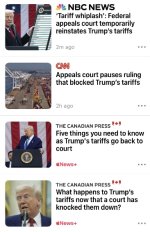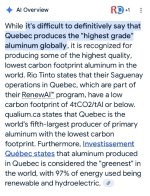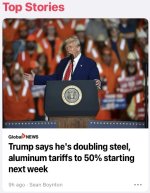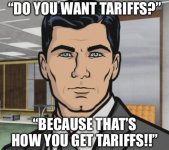Well, here’s a new twist. The U.S. president does not enjoy “unbounded authority” to impose tariffs as he sees fit, the U.S. Court of International Trade has ruled in a decision that places a strict curb on a tool Donald Trump has used as a cudgel in international relations? How ‘bout dem apples?
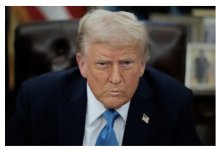

The ruling, which will almost certainly be appealed, applies only to tariffs imposed under the International Emergency Economic Powers Act, or IEEPA.

(Some of the levies Mr. Trump imposed on Canadian imports, including those on steel, aluminum and cars, have been set in place under other authorities not covered by the ruling)
Nonetheless, the unanimous ruling — written by a panel of three judges, one of them appointed by Mr. Trump — is a strong rebuke of the tariffs Mr. Trump placed on Canada and Mexico for fentanyl-related grounds, as well as global tariffs he ordered on so-called Liberation Day. Hmmm…

 apple.news
“They may be popping some champagne corks in Ottawa as well as we are doing here,” said Ilya Somin, a law professor George Mason University who is co-counsel on one of the cases, filed on behalf of several U.S. businesses.
apple.news
“They may be popping some champagne corks in Ottawa as well as we are doing here,” said Ilya Somin, a law professor George Mason University who is co-counsel on one of the cases, filed on behalf of several U.S. businesses.
“The ruling is not just limited to the plaintiffs in the case. It’s a permanent injunction against the tariffs overall,” he said. “And so if it stands, then it will stop all of these tariffs — both the Liberation Day tariffs against almost every country in the world, and also the specific ones against Canada, Mexico and China.”

 apple.news
The ruling covers two cases filed against the tariffs, one by businesses that rely on imports and another filed by a dozen states.
apple.news
The ruling covers two cases filed against the tariffs, one by businesses that rely on imports and another filed by a dozen states.
In the decision, the Court of International Trade says the text of IEEPA that allows the president to regulate imports does not authorize ”the President to impose whatever tariff rates he deems desirable. Indeed, such a reading would create an unconstitutional delegation of power.”

 apple.news
apple.news


 apple.news
Will this change anything though? Will Trump even care? Will he have Elon use Dodge or whatever to furlough these three judges as wasteful to the taxpayers?
apple.news
Will this change anything though? Will Trump even care? Will he have Elon use Dodge or whatever to furlough these three judges as wasteful to the taxpayers?

 apple.news
The U.S. Constitution specifically places the powers to tax and tariff in the hands of congress, although legislators have in past decades delegated “some” of that authority to the presidency. But much of that authority, the ruling says, must be exercised using other legal authorities, which have much more stringent regulatory requirements and cannot be imposed at the presidents whim.
apple.news
The U.S. Constitution specifically places the powers to tax and tariff in the hands of congress, although legislators have in past decades delegated “some” of that authority to the presidency. But much of that authority, the ruling says, must be exercised using other legal authorities, which have much more stringent regulatory requirements and cannot be imposed at the presidents whim.
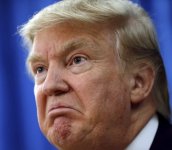
For that reason, the decision says Mr. Trump’s “Worldwide and Retaliatory tariffs” — including the baseline 10 per cent tariff imposed on April 2 — are “contrary to law.”

 apple.news
The court rejected an argument that Mr. Trump was exercising political judgment in assessing and responding to an emergency, and therefore his actions could not be scrutinized by a court.
apple.news
The court rejected an argument that Mr. Trump was exercising political judgment in assessing and responding to an emergency, and therefore his actions could not be scrutinized by a court.

 www.youtube.com
Instead, it said, to use emergency powers under IEEPA, a president must: act in response to a foreign threat; that threat must be “unusual and extraordinary”; a national emergency must be declared; and the president’s actions must “deal with” the threat as it has been identified.
www.youtube.com
Instead, it said, to use emergency powers under IEEPA, a president must: act in response to a foreign threat; that threat must be “unusual and extraordinary”; a national emergency must be declared; and the president’s actions must “deal with” the threat as it has been identified.

The court rejected the fentanyl-related tariffs against Canada and Mexico because they do not deal with the problem of illegal narcotics importation into the U.S. Merely using tariffs as a tool of leverage is not allowed under the law, the court wrote.
”A dam deals with flooding by holding back a river,” the court wrote. The Trump administration’s argument, by contrary, is far more expansive. ”If ’deal with’ can mean ‘impose a burden until someone else deals with,’ then everything is permitted” whether the dam is fictional or real???
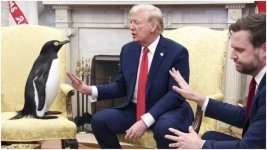
Instead, the court found, IEEPA was specifically written to constrain presidential powers.

The decision cited a comment from the late John Bingham, a former member of the House of Representatives who chaired the House International Relations Committee’s Subcommittee on Economic Policy. Mr. Bigham criticized a predecessor piece of legislation as giving “the president what could have been dictatorial powers that he could have used without any restraint by the Congress.”
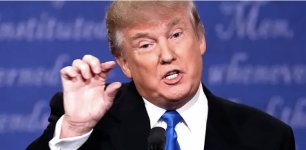
The attorney general of New York, one of 12 states involved in the lawsuit, welcomed the decision.
"The law is clear: no president has the power to single-handedly raise taxes whenever they like," Letitia James said.
"These tariffs are a massive tax hike on working families and American businesses that would have led to more inflation, economic damage to businesses of all sizes, and job losses across the country if allowed to continue," she added.

 apple.news
apple.news


The ruling, which will almost certainly be appealed, applies only to tariffs imposed under the International Emergency Economic Powers Act, or IEEPA.

(Some of the levies Mr. Trump imposed on Canadian imports, including those on steel, aluminum and cars, have been set in place under other authorities not covered by the ruling)
Oil prices fall as investors assess US court ruling on Trump tariffs — Reuters
Oil prices fell over 1% on Thursday, retreating from earlier gains, as investors weighed the potential effects of a U.S. court ruling that blocked the most sweeping of President Donald Trump's tariffs.
“The ruling is not just limited to the plaintiffs in the case. It’s a permanent injunction against the tariffs overall,” he said. “And so if it stands, then it will stop all of these tariffs — both the Liberation Day tariffs against almost every country in the world, and also the specific ones against Canada, Mexico and China.”
U.S. court rules Trump does not have ‘unbounded authority’ to impose tariffs — The Globe and Mail
Unanimous ruling is a strong rebuke of the levies the U.S. President placed on Canada and Mexico for fentanyl-related grounds
In the decision, the Court of International Trade says the text of IEEPA that allows the president to regulate imports does not authorize ”the President to impose whatever tariff rates he deems desirable. Indeed, such a reading would create an unconstitutional delegation of power.”
Trump was just asked about the ‘TACO trade’ for the first time. He called it the ‘nastiest question’ — CTV News
Wall Street has been riding a historic roller coaster the past few months due to Donald Trump’s on-again, off-again tariff threats. Now, investors are learning to take his words with a grain of salt — and a bit of salsa, too.

The ‘TACO Trade’ That Has Trump Fuming — The Wall Street Journal
President says ‘Trump Always Chickens Out’ claim is wrong and tariff changes are negotiation
US court blocks most Trump tariffs, says president exceeded his authority — Reuters
A U.S. trade court blocked most of President Donald Trump's tariffs in a sweeping ruling on Wednesday that found the president overstepped his authority by imposing across-the-board duties on imports from U.S. trading partners.

For that reason, the decision says Mr. Trump’s “Worldwide and Retaliatory tariffs” — including the baseline 10 per cent tariff imposed on April 2 — are “contrary to law.”
Markets shrug off US appeals court's decision to reinstate Trump tariffs — Reuters
Wall Street closed higher on Thursday, largely shrugging off a decision by a federal appeals court late Thursday reinstating President Donald Trump's tariffs. This came a day after a trade court blocked most of the U.S. president's tariffs going into effect.

"YOU CAN’T HANDLE THE TRUTH – Baby Marine Tribute to Jack Nicholson 🇺🇸"
This Memorial Day, we’re reporting for duty with a baby-sized blast of truth.In a fierce and funny tribute to Jack Nicholson’s unforgettable courtroom monolo...

The court rejected the fentanyl-related tariffs against Canada and Mexico because they do not deal with the problem of illegal narcotics importation into the U.S. Merely using tariffs as a tool of leverage is not allowed under the law, the court wrote.
”A dam deals with flooding by holding back a river,” the court wrote. The Trump administration’s argument, by contrary, is far more expansive. ”If ’deal with’ can mean ‘impose a burden until someone else deals with,’ then everything is permitted” whether the dam is fictional or real???

Instead, the court found, IEEPA was specifically written to constrain presidential powers.

The decision cited a comment from the late John Bingham, a former member of the House of Representatives who chaired the House International Relations Committee’s Subcommittee on Economic Policy. Mr. Bigham criticized a predecessor piece of legislation as giving “the president what could have been dictatorial powers that he could have used without any restraint by the Congress.”

The attorney general of New York, one of 12 states involved in the lawsuit, welcomed the decision.
"The law is clear: no president has the power to single-handedly raise taxes whenever they like," Letitia James said.
US trade court blocks Trump's sweeping tariffs — BBC News
The Trump administration lodged an appeal against the ruling shortly after it was announced.






